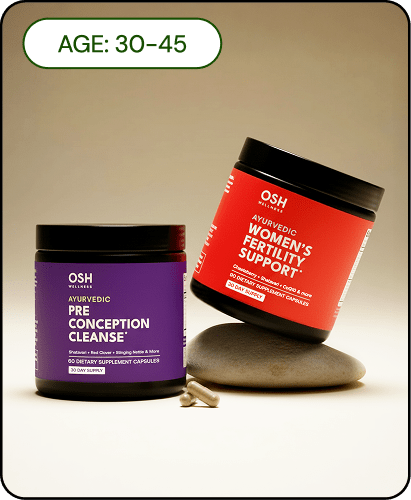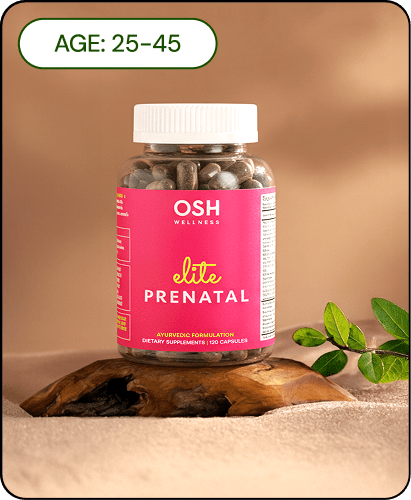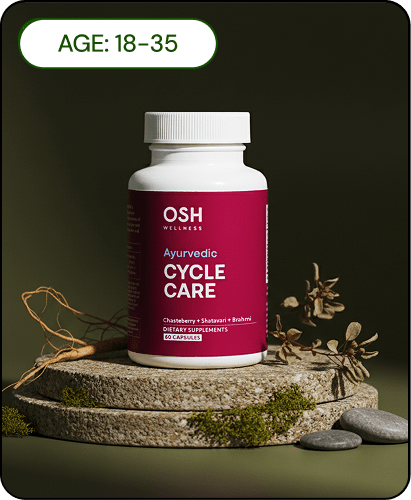Table of contents
Fatigue isn't anything new for postpartum moms. There are sleepless nights, early morning wakeups, and care routines. Even as you enter the later stages of postpartum and motherhood, playdates, household responsibilities, and more can make you feel like you're in a daze.
However, how do you know if your postpartum exhaustion is usual or something more? Extreme postpartum fatigue that affects things like cognition and libido and doesn't seem to ease up could be a sign of adrenal fatigue.
You may have heard this phrase circulating in mom groups and holistic health communities. It seems like adrenal fatigue postpartum is a common affliction these days. But until recently, not much was understood about this condition; it was thought that postpartum tiredness was normal and nothing to worry about.
In truth, our hormones go through significant fluctuations after birth. These changes, combined with the energy-zapping routines and stress of the fourth trimester, can leave our adrenal glands and hormones struggling to keep up. Affecting our mood, sleep, energy, and libido.
What Causes Adrenal Fatigue?
Stress is known to affect the human body. In the case of postpartum adrenal fatigue, it is believed that chronic stress, either physical or mental, can fatigue the adrenal glands. You may feel the effects if they can't keep up with hormone production. Although the condition of adrenal fatigue is not yet recognized by the medical community, how you feel is likely genuine.
Stress is undoubtedly a common factor in many postpartum mums' lives. The baby crying, doctor's appointments to rush to, dinner to make, exercise, no sleep; the list of stressors seemingly goes on and on. When you're stressed, your brain will secrete a hormone that is received by your pituitary gland. In turn, the gland and the other adrenals secrete cortisol, epinephrine, and norepinephrine.
Cortisol is commonly known as the stress hormone. It raises blood sugar, stops non-essential body processes, and helps promote the availability of tissue-repair substances in your body. Usually, this response is beneficial in "fight or flight" scenarios. However, chronic stress or a super high-stress event (like childbirth) can result in a hormonal imbalance. This disruption in the normal function of your hormones elicits a range of symptoms.
What Are the Symptoms of Postpartum Adrenal Fatigue?

Many moms equate adrenal fatigue to postpartum exhaustion. They simply feel like they can't keep up with day-to-day responsibilities. Mainly because everyday stressors, such as trying to get children out the door for school or activities, can trigger overwhelming responses. It isn't unusual to experience anxiety, agitation, cravings, or strong emotions to the tiniest stressors.
Other symptoms of adrenal fatigue postpartum can include:
- Trouble sleeping
- Inability to wake up
- Cravings for stimulants
- Sugar and salt cravings
- Lack of motivation
- Brain fogginess
- Fatigue
- Low libido
- Irritability
- Acne or rashes
- Depression
- Suppressed immunity
- Dizziness
While it is normal to experience postpartum tiredness, adrenal fatigue postpartum will often feel like something more than a lack of sleep or the exhaustion that comes from birth and caring for a newborn.
Women with undiagnosed adrenal fatigue may wonder, How long does postpartum fatigue last, and when will I feel like myself again? That can be another clue. Postpartum fatigue is usually at its peak during the first month following birth. From months two to four, it decreases significantly. However, if you feel like there is no light at the end of the exhaustion tunnel, it may be time to work with a practitioner who can evaluate you for adrenal fatigue.
How is Adrenal Fatigue Diagnosed and Treated?
Adrenal fatigue is not yet a medically recognized condition. Therefore, finding a practitioner who listens to your concerns and is open to exploring the idea of adrenal fatigue can be essential. Additionally, checking for other health issues can also be beneficial because the symptoms can be vague and similar to other conditions.
Usually, your doctor will evaluate you and try to rule out the following:
- Postpartum depression
- Anemia
- Infections or illness
- Autoimmune diseases
- Diabetes
They'll typically want to check for biological and mental health conditions that could explain your symptoms.
Treatment for adrenal fatigue can look different for everyone. Sometimes, your doctor may want to evaluate your diet and determine if any nutrients are lacking. They may recommend adjusting your lifestyle or trying to improve your sleep habits. Understandably, these things can be tricky when you're a new mom.
Is There Anything I Can Do At Home To Support My Body?
If you're looking for natural ways to help return your hormonal balance, here are a few ideas you may want to try. Remember, discussing supplements and lifestyle changes with your doctor is essential before trying them out is always recommended.
-
Eat consistently and regularly
- First, postpartum moms need a rich supply of nutrients to help them heal from birth, keep up energy, and produce breast milk. Additionally, skipping meals can wreak havoc on blood sugar levels, impacting hormone production. Try to eat well-balanced meals with sufficient protein at regular intervals.
-
(Try to) Get Quality Sleep
- This can be a challenge with a baby, but accepting help when you can so you can sleep is critical. Don't feel like you should be doing chores instead of napping, and don't hesitate to reach out when you feel exhausted.
-
Cuddle your little one
- Nursing and snuggling your baby can trigger your body to release oxytocin. This hormone can help prevent the adverse effects of stress.
-
Consider supplements
- Specific vitamins and minerals are thought to be especially effective against adrenal fatigue, such as magnesium and Ashwagandha.
You don't need to try all of these things at once. Do what you can, and don't forget to take a moment to breathe. You're a fantastic mom doing your best; that's always enough!
Well-Rounded Supplements for Adrenal Fatigue and Postpartum Concerns
We know you have probably seen adrenal cocktails, specific remedies, and single-ingredient supplements recommended for adrenal fatigue. But in the spirit of Ayurveda, we believe in taking a well-rounded approach to motherhood wellness. Our products are designed to support you in many ways, addressing the variety of concerns a woman may experience after giving birth to her child.
Our Lactation and Postpartum support capsules are excellent for supporting breastfeeding goals. Still, they were designed with so much more in mind. They're full of herbs that help promote hormonal balance, reduce inflammation, increase vitality, promote restful sleep, and boost healing. The easy-to-swallow form is the most effortless part of your day!
Osh Wellness Golden Latte for Motherhood is a restorative and enjoyable way to settle down after a long day. Its ingredients, like turmeric and black pepper, are anti-inflammatories. At the same time, Ashwagandha is adaptogenic, helping to fight against the harmful effects of stress.







